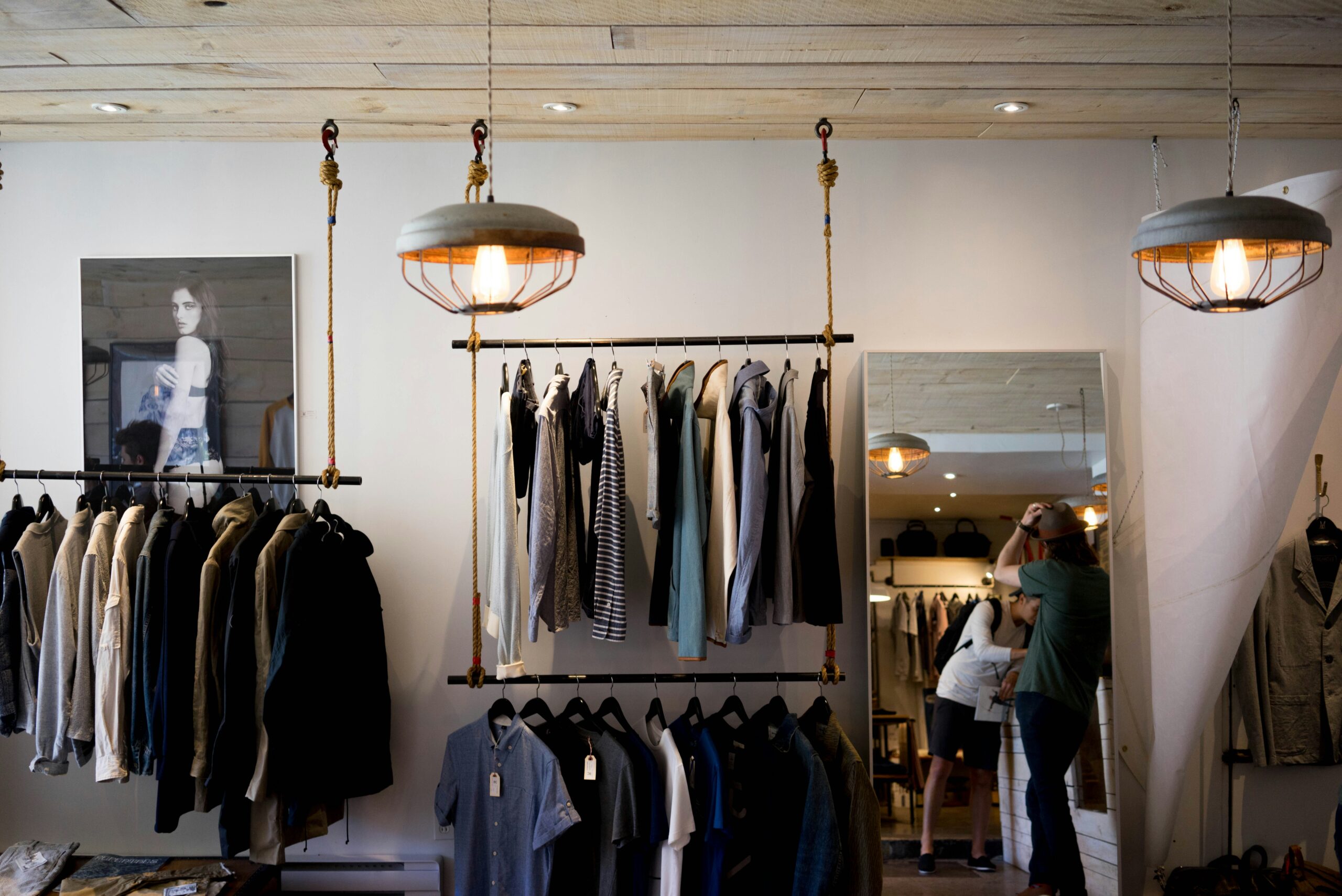By 2023, artificial intelligence (AI) is set to bring £630 billion to the global retail world. Dave Antrobus, the innovator at Inc & Co, leads this change in the UK. He uses AI to change many aspects of retail, like making shopping better for customers and making operations more efficient.
With Antrobus‘s leadership, AI in retail is now more than a dream—it’s real. By using smart AI algorithms, shops can make shopping more personal, manage stock better, and enhance the whole shopping journey. This change is happening fast, making the retail world sit up and take notice.
The Role of AI in the UK Retail Market
AI in Retail is shaping the future of shopping in the UK. It follows the trend of using technology to enhance the shopping experience. Retailers are changing their ways of working and how we buy things.
AI’s big role is in understanding customer habits. Retailers use AI to make shopping fit each person’s likes. This means businesses can see what people might want before they do. Thus, AI brings better customer service and happiness.
Another key advantage is in keeping the right amount of stock. AI predicts what and when something will be in demand. This means less waste and always having products ready for buyers. AI also makes paying for items quicker, which buyers like.
AI is not a passing phase in UK shops, but a big leap forward. With new AI advances, we expect the retail sector to grow and bring new ideas. As shops use more AI, the way we shop is getting better and matching new trends.
How Dave Antrobus is Leading Technological Innovation
Dave Antrobus is known for being a catalyst in tech innovation, especially in retail. He’s at the forefront of blending new tech with traditional retail. This mix not only improves shopping for customers but also makes shops run better.
Antrobus is making waves by using AI in the retail world. He sees that the future of buying things is closely linked to tech. He’s always looking for new ways that fit this idea. His work includes AI for keeping track of stock to creating shopping experiences that are tailored to what customers like.
With Antrobus leading, the retail world has seen better sales, lower costs, and smoother processes. He shows that using AI isn’t just about keeping up. It’s about beating the competition. His view on AI’s role in retail shows a promising path. It points to more use of AI, making shopping smarter and more fun for everyone.
AI in Retail: Transforming the Shopping Experience
The way we shop is changing thanks to AI. Brands like Brunello Cucinelli now handle up to 12,000 online questions daily with AI. This tech improves how shoppers feel by making services quicker and more personal.
AI does more than just answer questions. It suggests products you might like, making your shopping experience richer. For instance, Miu Miu saw a 93% sales jump, showing how tech can boost shopping. Meanwhile, Prada’s revenue rose by 17%, proving AI’s positive effect on sales.
AI is merging the online and in-store worlds. It aims to make shopping smooth, whether you’re buying in-person or online. This mix lets customers enjoy the best of both worlds.
But AI’s role isn’t just about buying things. It also helps behind the scenes, like in stocking items and making supply chains run better. Overall, AI aims to make shopping better at every point. It’s key for shops wanting to meet today’s consumer needs.
AI-driven Supply Chain Optimisation
AI is changing how supply chains work, making them more efficient and effective. By using AI in logistics and managing stock, businesses can move goods better, keep just the right amount of stock, and know what their customers will want next. This means they can meet customer needs quickly and spend less money doing it.
The use of real-time analytics is a big change. Companies can now watch their supply chains as they happen and make quick changes. This helps them deal with problems quickly, making the supply chain more reliable, productive, and pleasing to customers.
Also, AI helps companies know just how much stock to keep, avoiding having too much or too little. Big companies like Amazon and Walmart use AI to keep their stock levels just right and sell more goods faster.
AI also helps plan the best delivery routes and schedules. It looks at things like traffic, weather, and when customers are available. This makes deliveries quicker, uses less fuel, and saves money.
Additionally, AI helps keep the supply chain running smoothly by spotting when equipment might break down. This way, companies can fix problems before they happen, avoiding expensive stops and keeping everything moving.
In summary, using AI in supply chains is making a big difference in logistics, stock management, and how efficient everything is. As AI gets better, companies that use it well will stand out from their competition.
Challenges and Ethical Concerns in AI Adoption
Introducing AI into the retail world opens up many opportunities but also faces big challenges. One main challenge is keeping data safe. Retailers need to follow laws like GDPR to protect customer info. They must work towards an AI that’s fair, avoiding biases that could unfairly judge customers.
Another key challenge is moving to AI-friendly systems. A report from June 2024 shows around 75% of customers think this move is crucial. Yet, the cost and effort needed can be big problems for many companies.
Also, ethical AI is very important. It means making AI that people can trust and that works fairly. Retailers can use tools like Azure AI Content Safety to find risks and filter content. This helps make AI more responsible.
We need to find a balance between AI’s benefits and the ethical issues it brings up. Retailers focusing on ethical AI can build trust with their customers. This is key for success in a world that’s increasingly relying on AI.
Successful Case Studies in the UK Market
The UK market shows fascinating AI success stories. Samsung used the Galaxy Z Flip 6 at the Olympics, a big hit. The Galaxy Z Fold 6 became 15% more popular in the UK thanks to AI. This shows how smart tech can make shopping better and boost sales.
TOD’S Group boosts its clean energy with SolarEdge technology. They installed solar panels that cover 78% of their power needs each day. This move cuts carbon emissions and shows how tech keeps operations eco-friendly.
GlaxoSmithKline (GSK) saw sales jump 13% to £7.9 billion, with profits up 21%. They used AI for better planning and predictions. Sales of special meds and vaccines grew, keeping GSK a market leader. Their drugs, Dovato and Trelegy, are prime examples of AI boosting growth.
These success stories show how AI is changing business across different industries. As UK innovation grows, these examples can guide future tech uses. They show AI’s role in changing how retail works.
The Future of AI and Retail in the UK
The UK’s retail landscape is on the brink of a big change, thanks to AI. Soon, shopping will become more personalised and smooth. This is all thanks to the use of smart AI technologies.
Companies like Meta Platforms and ARM Holdings are leading the way with new tech. Their work is making shopping easier and better for everyone. This means we’ll see better customer service and smoother shop operations.
AI will also change how shops manage their supplies and help customers. Tools like predictive analytics will let shops know what buyers want in advance. This keeps them competitive in a fast-changing market.
Look at Nvidia and Advanced Micro Devices, for example. They show how AI boosts efficiency and value in retail. Nvidia’s success is a big hint that using the latest tech is crucial to staying on top.
AI’s growth means, even more, improvements are on the way for shopping. Shops will use AI for tailored suggestions, faster checkouts, and better customer care. This will make shopping much more enjoyable for everyone.
To sum up, UK retail’s future with AI is full of promise. Retailers adopting AI will see big changes in how they work and interact with buyers. As tech keeps advancing, it’ll bring new and exciting shopping experiences to customers all over the UK.
Integrating AI with Other Technologies
Integrating AI with technologies like the Internet of Things (IoT) and cloud computing is sparking new innovations in retail. These integrations create a technology ecosystem. This improves how shops operate and how they interact with customers.
Meta is leading with AI and IoT to beat the competition. They spent $8.47 billion, which was less than expected, on AI. CEO Mark Zuckerberg thinks Meta’s AI will be the top AI assistant soon. This shows how working together changes the business world.
The growth of cloud computing is also pushing these innovations. For example, the new LLama 3.1 405B AI model competes with top AI companies. So, Meta plans to spend more on AI innovations by 2025.
Amazon is also using these integrations well. Their Just Walk Out technology mixes AI, IoT, and AI models to make shopping faster. It’s used in over 170 places, making shopping smoother and boosting sales.
The beauty and fashion industries are also seeing the benefits. For example, Brunello Cucinelli and Prada are using AI to chat with customers and improve production. Brunello Cucinelli handles up to 12,000 questions daily. Prada saw a 17% sales increase in the second quarter of 2024 because of AI.
The future of retail is in systems that combine AI and IoT smoothly. These systems make shops work better and offer a unique shopping experience. With Meta and Amazon’s work, it’s clear that integrating different technologies can transform retail.
Conclusion
It’s clear that AI in retail is changing the game. Dave Antrobus is leading this change with his innovative ideas. His work is transforming how UK shops operate, making them more digital and customer-focused. This shift is huge for UK businesses. They must find the right mix of new tech and putting customers first.
AI is making shopping better by improving how things are sold and what customers get. Many shoppers, about 83%, like getting deals meant just for them. But less than half think these offers matter. This shows a big chance for firms to use AI in a smart way. It’s especially big for getting Gen Z to buy more, as many find products via social media.
Case studies have shown that videos you can shop through boost sales. This is seen on sites like Pinterest. These methods get more clicks and cost less for the retailer. Dave Antrobus‘s vision is making the UK a leader in shopping tech. As digital ways to shop grow, UK stores need to keep up to be successful in this fast-changing market.

